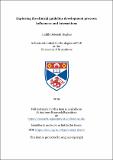Exploring the clinical guideline development process : influences and interactions
Abstract
Evidence-based clinical guidelines serve as an important support for medical decision-making.
To date, research on clinical guidelines has focused mainly on guideline
development methodology and the extent of guideline implementation. How guideline
groups utilise various forms of evidence and the social processes involved in developing
clinical guidelines have not yet been fully explored.
This qualitative study considers the individual, group and external factors that influenced
the recommendations made by one guideline development group for the guideline
concerning diagnosis and management of macular degeneration within the
ophthalmology therapeutic area in the UK. Using direct observation, interviews and
document analysis methods, this study explored, over 27-months, how the guideline
group proceeded from reviewing the evidence on this condition to drafting guideline
recommendations.
This research provides a detailed account of how the guideline group – working within
an environment that includes influential external stakeholders – interpreted evidence,
interacted and functioned as a group, and made consensus decisions on guideline
recommendations. The study reveals that the ready availability (and acceptability) of
evidence shapes the extent of reliance on expert opinion. In circumstances of low
evidence availability, expert opinion is relied upon and factors such as group composition
and dynamics, resource availability and external network challenges appear to be
particularly important in the guideline development process and in shaping the guideline
recommendations.
The study is the first to provide an account of the guideline development process in the
ophthalmology area as well as adding, more generally, to the empirical literature on the
clinical guideline development. The findings suggest that clinical and economic evidence
does not easily or smoothly translate into strong recommendations. Rather, guideline
development involves the interplay of many factors. An additional contribution of this
research is the development of an integrative framework to capture and analyse these
factors within the guideline development process.
Type
Thesis, PhD Doctor of Philosophy
Rights
Embargo Reason: Embargo period has ended, thesis made available in accordance with University regulations
Collections
Items in the St Andrews Research Repository are protected by copyright, with all rights reserved, unless otherwise indicated.

